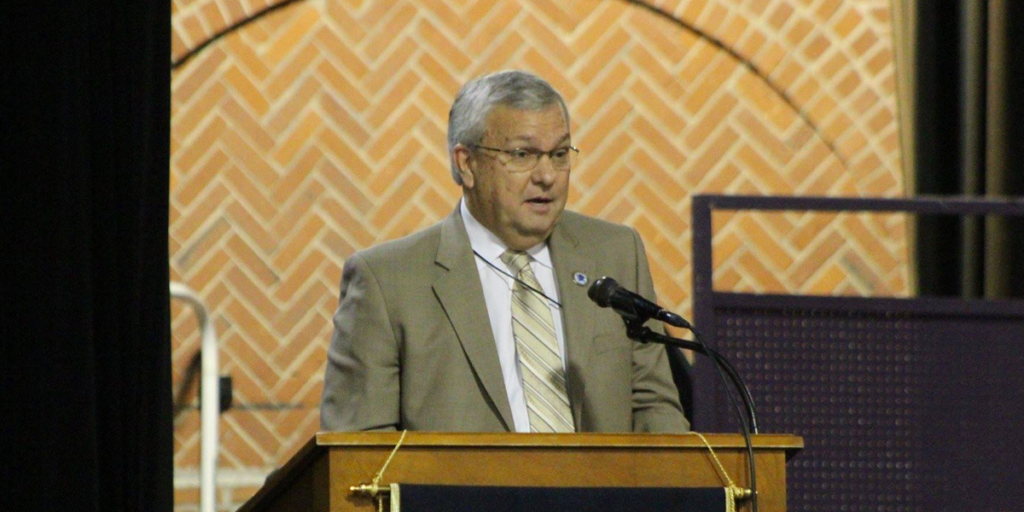Troy University hosts special session of Alabama Supreme Court for landmark case

The Alabama Supreme Court held a special session at Troy University on Wednesday, where it heard two cases. Most noticeably was the landmark care of Jessie Livell Phillips v Alabama. The case dates back to June 2012 when Jessie Phillips, 32, of Albertville, was convicted in of killing his wife, Erica Droze Phillips, who was eight weeks pregnant with their unborn child. He was sentenced to death. Phillips is now appealing the case, which was the first prosecution and conviction under Alabama’s Brody Act, which makes it a homicide to kill an unborn baby in an attack on its mother. Phillips was prosecuted in Marshall County by then District Attorney Steve Marshall. Marshall, now the Alabama Attorney General, was in attendance for oral arguments in the appeal The court regularly holds special sessions at various locations across the Yellowhammer State.
Northern Beltline construction loses funding, now competing with other state projects

Construction delays to complete Birmingham’s Northern Beltline — a 52-mile, six-lane highway that would connect Interstate 459 in Bessemer with Interstate 59 in northeast Jefferson County — continue due to loss of funding, according to AL.com. First started in 2014, beltline construction was later delayed in 2016 to loss of funding for the estimated $5.3 billion project. The Alabama Department of Transportation (ALDOT) hoped to start working on the project again in 2019, but the project, which was being funded by the Appalachian Development Highway System, was not funded in the 2018 federal transportation bill. Now, the project is going to need state funding to continue in 2019 as originally planned. “Unfortunately, adding lanes along existing, heavily congested roadways typically take a higher priority since the relative cost is so much less for relief,” Linda Crockett, spokesperson for ALDOT’s East Central Region, told AL.com. “The Northern Beltline is obviously needed but will take several years to fund and construct,” she added. “If there is a change in funding, either through an increase in gas taxes or if funds are dedicated toward the ADHS again, it may help the construction pick back up, but for the foreseeable future, it will be very limited.” One of the many projects the could compete with the beltline funding is that of the proposed, competing bridge to the Foley Beach Express down in Orange Beach. This proposed bridge could divert much needed state resources away from other critical state infrastructure projects such as the beltline. “Construction of the Northern Beltline is expected to enhance cross-region accessibility, create jobs, stimulate economic growth and respond to existing development, as well as address future traffic growth,” said BetterBeltline.org. “Birmingham is unique among U.S. urban areas because it has four interstates that converge and connect to other southeastern metropolitan areas. The Beltline touches every mainline interstate in Jefferson County and creates significant opportunities for growth and prosperity.” But if Alabama had to pay the tab on its own, the project “would never pass the idea stage,” Beth Osborne, who spent five years as a senior policy official in the Obama administration’s Transportation Department and is now at the advocacy group Transportation for America, told Environment and Energy News. ALDOT last projected the Northern Beltline should be completed in 2054. Only time will tell if Osborne is correct.
20 percent of Alabamians have concealed carry permit — highest in the country

The national gun debate continues to divide the nation leaving many Americans feeling as though their 2nd Amendments rights may soon be on the chopping block. In response to the uncertainty, more Americans across the country have been going out and getting guns. According to a July 2017 study by the Crime Prevention Research Center (CPRC), nearly two million Americans obtained concealed carry permits in 2016, meaning one in every 20 citizens now has a concealed carry permit (CCP). “All states now allow concealed carry,” CPRC President John Lott Jr. said. “And they are all issuing more permits. Not surprisingly, concealed carry is much more popular in states where permits are relatively inexpensive and easy to obtain.” Which is perhaps one of the reasons why Alabama, a known red-state, has the highest number of permit owners, 20 percent, of any state. Conceal carry permits in Alabama Alabama issues concealed handgun licenses only to residents of Alabama, through the sheriff of their county of residence. While permit fees vary by county, they range from $7.50 to $30 per year. WKRG reports, “According to [NRA] data, a vast majority of counties charge $100 for a five-year permit. At least, 46 out of 67 counties do.” The state does not issue carry conceal permits to out of state residents. Alabama reciprocity maps
Montgomery Public Safety Director Chris Murphy announces retirement

Montgomery Public Safety Directory (MPDS) Chris Murphy will retire from city service at the end of year after seven years with the city and 40 years in law enforcement. “It has been my privilege for the last seven years to serve as Mayor [Todd] Strange’s director of Public Safety for the city of Montgomery, and this is also my 40th year in front-line public safety and law enforcement work,” said Murphy. “It is time now to welcome a new season in my life and a different sort of challenge.” The Auburn University alum has served as MDPS director since October 2010. He began his career in law enforcement with the Auburn Police Department in 1978. In 1981, he took a position with the Tennessee Bureau of Investigation as a special agent. In 1985, he joined the U.S. Secret Service, where he worked protection for seat presidents and vice presidents spanning from Ronald Reagan to George W. Bush. Upon his retirement from the Secret Service, former Ala. Gov. Bob Riley tapped Murphy to serve on his Cabinet as the director of the Alabama Department of Public Safety (ADPS). The Montgomery Department of Public Safety is the parent agency for all safety-related operations in the capital city. The department was formed in 2010, when Murphy came onboard, to streamline public safety services, increase efficiency, and better serve the public. Upon his retirement with the city, Murphy will join Merletti, Gonzales & Associates, an international security consulting firm, that was form formed by his former U.S. Secret Service colleagues. Montgomery Mayor Todd Strange plans to name Murphy’s replacement within 10 days. Murphy’s last official day of city service is Dec. 31.
Terri Sewell introduces Public Funds for Public Schools Act

Alabama 7th District U.S. Rep. Terri Sewell is hoping to close a tax loophole that diverts resources away from public schools with the introduction of H.R. 4269: Public Funds for Public Schools Act. The bill seeks to limit the double benefit of charitable contributions, which Sewell explains “allows the wealthy to turn a profit on donations to private school voucher organizations.” “As the daughter of two long-time educators and the proud product of Selma public schools, I know the power of public education,” said Sewell. “Today’s legislation would stop wealthy donors from cheating our tax system and diverting dollars away from children in our public schools.” Sewell continued, “Under current law, wealthy donors in states like Alabama can turn a profit on contributions to private school voucher organizations by claiming both state and federal tax benefits. At a time when our public schools are short on resources and Congress is struggling to find funding for important programs such as the Individuals with Disabilities Education Act (IDEA), we have a responsibility to close this tax loophole and protect public funds for public schools.” Sewell is referring to tuition tax credits (TTCs), which are offered to individuals or corporations in 18 states across the country who contribute to Scholarship Granting Organizations or school voucher nonprofits. In seven of these states — Alabama, Arizona, Florida, Georgia, Montana, Nevada, and South Carolina — the tax credit is dollar for dollar. In addition to receiving a full refund from their state, these donors qualify for a federal tax deduction on the same donation. Sewell wants to close the loophole in the tax code which allows this and disincentive the diversion of federal dollars from public schools. Under Sewell’s bill, savings created by the Public Funds for Public Schools Act could be reinvested in the school system to offset costs for K-12 education programs, like those under the Individuals with Disabilities Education Act (IDEA).
Military career fulfilled childhood dreams for Phenix City’s Denise Richardson

Many little girls dream of being a ballerina, a princess or perhaps a high-fashion model. Not Denise Richardson. At the tender age of 4, Richardson wanted to grow up and become a soldier. For a young girl whose family was immersed in a world “of all things Army,” her aspirations weren’t unusual. Her father and grandfather were U.S. Army veterans, and her brother was in the U.S. Marine Corps. “I was always a patriot,” said Richardson, a customer service representative in Alabama Power’s Phenix City Office. “My parents instilled it in me. Even as far back as a toddler, I wanted to be a soldier like my daddy. I am a firm believer it’s God’s calling to go into the service. “It’s a duty to serve, and it’s a privilege to serve,” said Richardson, who served 31 years in the Army National Guard and three years active U.S. Army. As a teen, Richardson was in ROTC (Reserve Officers’ Training Corps) until her 1976 graduation from Central High School in Phenix City. “I went straight from high school into the military,” Richardson said. “I graduated from high school on a Friday night and was on a bus on Sunday to start basic training.” Richardson spent 12 weeks at Fort McClellan in Anniston, where she took advanced intense training to work as a clerk for the Army Standard Installation and Division Personnel Reporting System. During Richardson’s active duty, she married and had her first child. With an infant, Richardson said that continuing in active duty would have been impossible: At her rank, she wouldn’t have been allowed to take her child overseas. So Richardson stayed in Alabama to embark on her next dream: earning a college diploma. “I was happy to serve in the Army, but I’d always wanted to graduate from college,” she said. “I was determined to go to college.” Richardson took advantage of the GI Bill. In pursuit of a business degree, she began attending Chattahoochee Valley Community College in Phenix City. She relished her first taste of higher learning, but the yearning to serve tugged at her heart. “I loved the military,” Richardson said. In 1983, Richardson signed on for the National Guard. She drilled one weekend monthly and for two weeks of the year. From clerk to heavy mechanic Richardson found that no clerk positions were open and, instead, took a job many women would find daunting: She became a wheeled vehicle mechanic. “I worked on Jeeps, Hummers and trucks,” Richardson said. “I did that pretty well.” After several years, she attended another military school to learn logistics, helping to track and manage the military supply chain. For a short time, she returned as a clerk. Later, Richardson went into heavy mechanics, becoming a tank turret repairman, which required three phases of training. “I enjoyed seeing how tanks and other large weapons systems were put together,” she said. Richardson had been promoted to staff sergeant, rank E-6 – just above sergeant and below sergeant first class – and was a noncommissioned officer. Promotion was becoming more difficult in the mechanical field. At 45, she decided to become a warrant officer. “I was accepted and attended warrant officer school at Fort Rucker. It was really rough,” Richardson said of the 30-day training. “But I made it.” As a warrant officer, she served in human resources for the National Guard. International tours of duty From 1990 to 1991, Richardson served in the Gulf War, the military operation to expel occupying Iraqi forces from Kuwait, which Iraq had invaded and annexed. “That was the first time I’d had shots fired over my head,” Richardson said. “It was the first time I was in the desert, my first experience in combat. “I was in areas where the enemy was shelling, in northern Saudi Arabia,” she said. “I wasn’t in the tanks – at that point, there were still some restrictions on women serving. But we were affected by rockets and not knowing who the enemy was. When the Iraqis retreated from Kuwait, some went into Saudi Arabia.” Richardson began working at Alabama Power in 1992. She continued to study at Faulkner University and theUniversity of Phoenix. From 2007 to 2008, Richardson served in Kuwait. After 20 years of college and the military, she earned her bachelor’s degree. “It took me a while, but I got it,” Richardson said, with a big smile. From 2009 to 2010, Richardson led the National Guard’s Yellow Ribbon Reintegration Program in Alabama, preparing soldiers who were being deployed and supporting family members while their soldier was away. “Deployment is a seven-day-a-week job,” she said. “It’s difficult going, and it’s difficult coming home. You’re on a high tempo; then you get home, and the bottom falls out. Click here to read more. Republished with permission from the Alabama NewsCenter.

